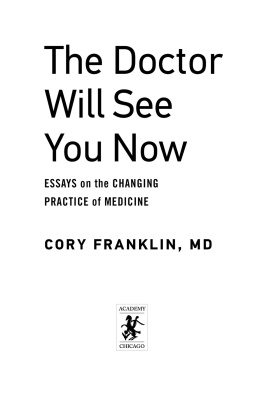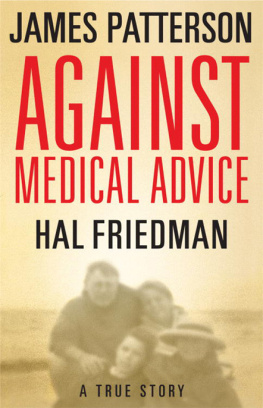Cory Franklin - The Doctor Will See You Now
Here you can read online Cory Franklin - The Doctor Will See You Now full text of the book (entire story) in english for free. Download pdf and epub, get meaning, cover and reviews about this ebook. year: 2017, publisher: Chicago Review Press, genre: Romance novel. Description of the work, (preface) as well as reviews are available. Best literature library LitArk.com created for fans of good reading and offers a wide selection of genres:
Romance novel
Science fiction
Adventure
Detective
Science
History
Home and family
Prose
Art
Politics
Computer
Non-fiction
Religion
Business
Children
Humor
Choose a favorite category and find really read worthwhile books. Enjoy immersion in the world of imagination, feel the emotions of the characters or learn something new for yourself, make an fascinating discovery.
- Book:The Doctor Will See You Now
- Author:
- Publisher:Chicago Review Press
- Genre:
- Year:2017
- Rating:4 / 5
- Favourites:Add to favourites
- Your mark:
- 80
- 1
- 2
- 3
- 4
- 5
The Doctor Will See You Now: summary, description and annotation
We offer to read an annotation, description, summary or preface (depends on what the author of the book "The Doctor Will See You Now" wrote himself). If you haven't found the necessary information about the book — write in the comments, we will try to find it.
The Doctor Will See You Now — read online for free the complete book (whole text) full work
Below is the text of the book, divided by pages. System saving the place of the last page read, allows you to conveniently read the book "The Doctor Will See You Now" online for free, without having to search again every time where you left off. Put a bookmark, and you can go to the page where you finished reading at any time.
Font size:
Interval:
Bookmark:
Copyright 2018 by Cory Franklin
All rights reserved
Published by Academy Chicago Publishers
An imprint of Chicago Review Press Incorporated
814 North Franklin Street
Chicago, Illinois 60610
ISBN 978-0-89733-932-2
A list of credits for the previously published pieces in this collection can be found on pages 269270.
Library of Congress Cataloging-in-Publication Data
Names: Franklin, Cory M., author.
Title: The doctor will see you now : essays on the changing practice of
medicine / Cory Franklin.
Description: Chicago, Illinois : Academy Chicago Publishers, [2018] |
Identifiers: LCCN 2017039624 (print) | LCCN 2017043313 (ebook) | ISBN
9780897339308 (adobe pdf) | ISBN 9780897339322 (epub) | ISBN 9780897339315
( kindle) | ISBN 9780897339292 (trade paper)
Subjects: LCSH: MedicinePracticeMiscellanea.
Classification: LCC R728 (ebook) | LCC R728 .F73 2018 (print) | DDC
610.68dc23
LC record available at https://lccn.loc.gov/2017039624
Cover design: Andrew Brozyna
Cover images: Doctor: Golden Sikorka/Shutterstock; pen: vladwel/Shutterstock.
Typesetting: Nord Compo
Printed in the United States of America
5 4 3 2 1
This digital document has been produced by Nord Compo.
RELATIONSHIP AND REPORTING
MEDICINE
The good physician treats the disease; the great physician treats the patient who has the disease.
SIR WILLIAM OSLER, MD
R EMEMBER YOUR PERSONAL PHYSICIAN? He or she may not be yours much longer. And even if you keep your doctor, the odds are he or she is not really working for you. Soon most doctors will have abandoned their private practices and become employees of hospitals, multihospital affiliations, or the government. Only 35 percent of doctors currently describe themselves as independent, compared with 62 percent in 2008. This trend will undoubtedly continue; a medical student starting training today has virtually no chance of starting his or her own solo practice.
How did this happen, and why is it a threat to patients? The main culprits are the government and the insurance companies. As a result of the payment provisions under the Affordable Care Act (ACA), the government essentially encouraged hospitals to own doctors, and it is likely these provisions will remain in any modifications of the ACA. With inscrutable logic, the government pays more for the exact same medical procedure or doctors visit if it is done in a hospital clinic rather than in an independent doctors office. This is a strong incentive for hospitals to buy physicians and their practices. Doctors may have little alternative but to take salaried hospital positions if their practices disband. Combine this with federal rules and regulations regarding electronic records and medical partnerships that make it prohibitively expensive for all but the largest physician partnerships to compete.
Over the past several years, more than a quarter of a million doctors have been informed their Medicare and Medicaid payments would be reduced because they have not sufficiently implemented electronic medical records. Small physician practices unable to afford the capital investment are hurt the worstjust another nail in their coffin.
The governments willing partner in the dismantling of private practice is the insurance industry. Even before the Affordable Care Act, insurance companies advocated narrow networksbusiness speak for deciding which doctors patients could chooseas the means to control costs, offer reduced premiums, and broaden coverage (without mentioning the opportunity to realize higher company profits).
Put simply: one way for insurance companies to control premiums is by limiting patients choices of doctors. These networks could change every few years; every time they do, some doctors will be shown the door. None of this bodes well for either American medicine or patients, no matter how the insurance industry and the federal bureaucracy spin it with corporate jargon like consolidated health systems, coordinated care delivery, or pooled financial risk. These large consolidated health systems eliminate any possible benefit derived from local competition. Consider that when Wal-Mart comes into a community and forces out the corner mom-and-pop grocery store, the locals may be opposed, but at least everyone generally benefits from greater product selection and lower prices. In todays brave new health care world, as corporatization increases there is less selection and prices do not drop.
But there is a far more ominous implication. The centuries-old bond between patient and physician, described by Hippocrates twenty-five hundred years ago, is in jeopardy. The mutual-trust relationship is frayed when physicians become corporate (or government) employees; their loyalties are divided between their employer and their patient. How does the doctor determine how to advise or treat a patient? Is it what is in the patients best interests, or is it adhering to performance goals and satisfaction surveys, which are increasingly being used as rewards or penalties that factor into the doctors salary?
Fortunately, in most cases, there is no conflict, and when there is, most doctors still act in their patients best interests. But now there is an ever-present threat the doctor will defer to a quality improvement initiative designed by a faceless manager in some distant corporate headquarters.
This new disconnect between patient and physician is typified by the electronic medical record. Despite never being adequately tested for actual utility, the computerized record was introduced to medicine over the last two decades at a cost of billions of dollars. In 2009 the government provided even more billions of dollars in bonuses if providers implemented the electronic medical record. The electronic record is admittedly easier to read and transmits information off-site better than paper records. But it has introduced an invisible barrier between patient and physician. Doctors now stare at a computer screen while they talk to patients and then spend an inordinate amount of time completing electronic records, time that would be better spent talking to patients. Cut-and-paste and poorly designed software templates create bad habits when doctors question and examine patients. And the records are anything but secure: millions of electronic medical records have been hacked or stolen; the information in millions more is routinely sold to third parties. Hardly a technology that engenders trust.
There has always been a love-hate relationship between doctors and society. Some physicians are lampooned as imperious jerks, and others are accused of doing too many tests and procedures. (President Obama famously made that assertion early in his presidency.) However valid these charges, one thing has always been true: with rare exception, even the most arrogant or venal physician has had the patients best interests at heart. Can the same be said of the new business mandarins in charge of health care? With physicians becoming pawns in a much larger game, who will look out for patients? We may never again be completely sure.
Well, first of all, let me say that I might have made a tactical error in not going to a physician for 20 years. It was one of those phobias that really didnt pay off.
WARREN ZEVON
T HE POORLY TOLD TRUTH may be the most misleading falsehood. Ezekiel Emanuel, a leading American physician, provoked national debate in 2014 by suggesting that most people should not live past age seventy-five. Later he sparked further controversy, advising healthy people to forgo annual physical exams. He wrote in the
Font size:
Interval:
Bookmark:
Similar books «The Doctor Will See You Now»
Look at similar books to The Doctor Will See You Now. We have selected literature similar in name and meaning in the hope of providing readers with more options to find new, interesting, not yet read works.
Discussion, reviews of the book The Doctor Will See You Now and just readers' own opinions. Leave your comments, write what you think about the work, its meaning or the main characters. Specify what exactly you liked and what you didn't like, and why you think so.









